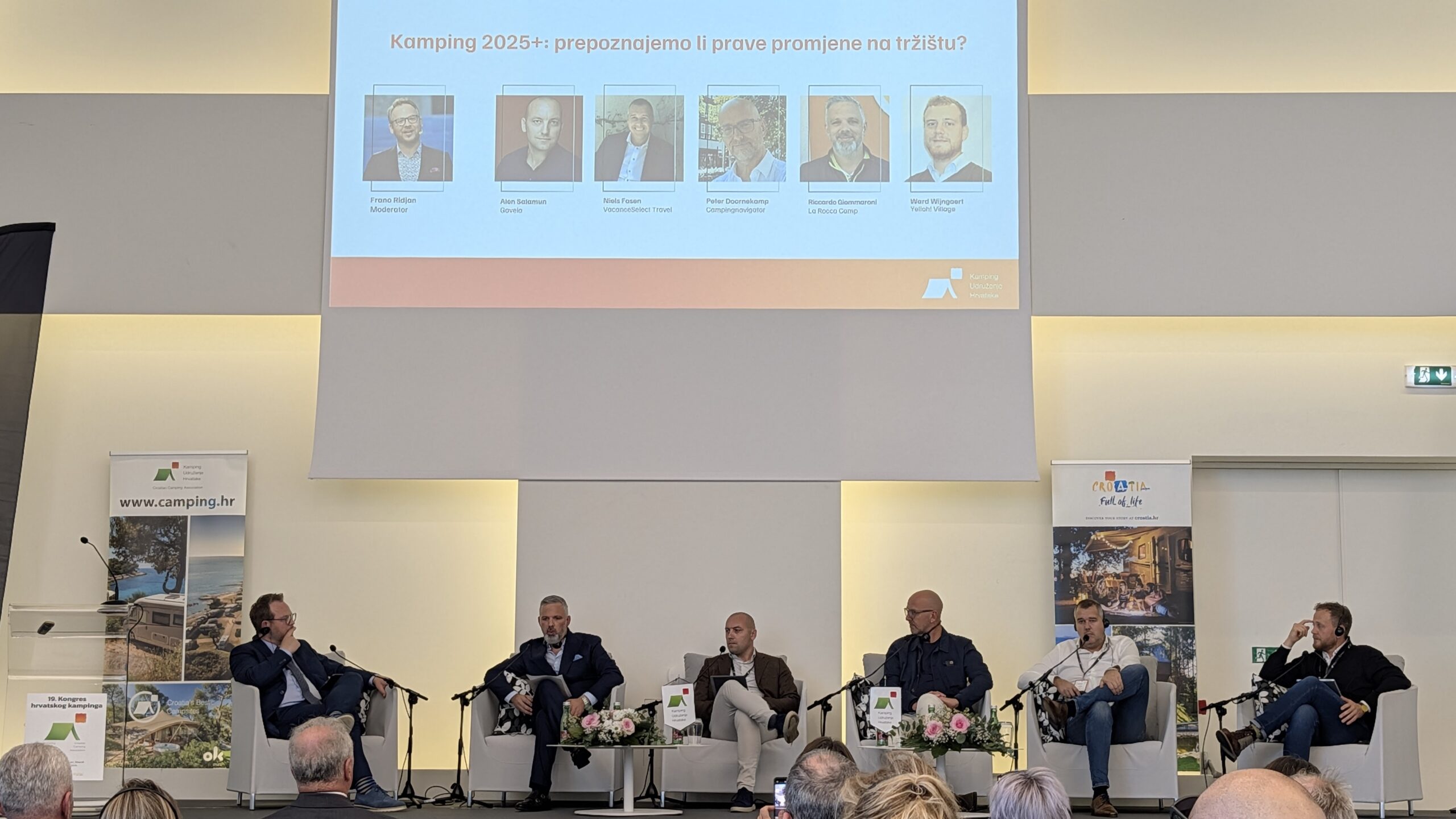Artificial intelligence, changing booking habits, and evolving franchise strategies are redefining how Europe’s campgrounds compete.
At the 19th Croatian Camping Congress, industry leaders explored how artificial intelligence, shifting traveler behavior, and evolving business models are shaping the future of outdoor hospitality across Europe.
The roundtable, powered by Adria and titled “Camping 2025+: Are We Recognizing the Real Changes in the Market?”, featured insights from Alen Salamun of Gaveia (Croatia), Niels Fasen of VacanceSelect Travel (Netherlands/France), Peter Doornekamp of Campingnavigator (Netherlands), Riccardo Giommaroni of La Rocca Camp (Italy), and Ward Wijngaert of Yelloh! Village (Spain/France).
AI Alters Guest Discovery and Visibility
Panelists noted that digital transformation continues to reshape how guests research and book their stays.
While page impressions on platforms such as Google have grown by more than 30%, click-through rates have dropped by up to 10%. The decline stems from AI-generated search summaries that provide users with answers directly, reducing the need to visit individual websites.
The discussion also emphasized that this new reality requires operators to strengthen their digital presence through quality content, technical optimization, and authentic storytelling.
The session cautioned that as AI crawlers increasingly index websites to generate snippets, only those with robust, well-maintained pages will retain visibility and booking potential.
Changing Travel Patterns Across Europe
Beyond marketing, the roundtable explored shifts in traveler behavior across Europe’s key camping destinations. Croatia’s performance was highlighted as one of continued strength, with steady growth compared to countries such as Italy and Spain.
Croatia’s appeal lies in its combination of high-quality facilities and friendly service—factors that continue to attract returning guests, particularly from the Netherlands and Austria.
Participants noted that while Italy experienced a modest 11% rise in demand and Croatia as much as 15 to 18%, Spain showed slower recovery. The panel attributed this to differences in market structure and domestic travel habits, as well as ongoing economic and policy factors.
At the same time, the conversation addressed ongoing price sensitivity and value perception among guests.
Some markets, particularly in Western Europe, are seeing signs of stagnation as travelers adjust to inflation and higher operating costs. Still, the discussion suggested that Croatia and Italy remain well-positioned to capture travelers seeking quality experiences at fair prices.
Franchise Alignment and Shared Standards
Franchise and brand alignment emerged as another key topic, with the roundtable highlighting the benefits of joining established networks that balance individuality with shared quality standards.
The session noted that franchise models in Europe—particularly those emphasizing marketing collaboration and brand visibility—offer smaller operators the ability to compete with major groups through pooled resources and international reach.
Rather than standardizing campsites into uniform replicas, participants explained that these systems aim to “standardize quality,” ensuring consistent guest expectations while preserving local character. This approach is vital in markets where digital reputation and online reviews directly influence booking decisions.
Evolving Accommodation Demand
The roundtable also discussed innovation in accommodation types, pointing to growing demand for mobile homes and glamping tents.
Data shared in the session suggested that in Croatia, around 17% of bookings now involve mobile homes, while tent-based stays account for roughly 25%.
This balance, they observed, reflects both the enduring appeal of traditional camping and the rising interest in comfort-oriented outdoor stays.
Looking ahead, panelists said that AI will continue to shape operations and guest engagement, not by replacing human roles but by automating repetitive tasks.
The session described AI as a tool that can free staff to focus on creativity, hospitality, and service quality.
Concluding the discussion, participants agreed that Croatia’s continued success depends not only on technology adoption but also on maintaining clear legal frameworks and stable conditions for operators.
For almost two decades, the Croatian Camping Congress, organized by the Croatian Camping Association (CCA), has established itself as the premier event for knowledge exchange, education, and networking within Croatia’s camping sector and related industries.
Since its inception in 2007, the congress has brought together more than 4,800 participants who have shared experiences, explored development trends across European and Croatian campsites, and learned about modern promotional tools and strategies.
Modern Campground continues to cover the Congress of Croatian Camping as it unfolds. For more information about the event, including the full program and updates, visit www.camping.hr.


